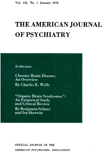Behavioral and biological effects of acute beta-endorphin injection in schizophrenic and depressed patients
Abstract
In this double-blind study, beta-endorphin, 4-15 mg, was administered intravenously to 6 schizophrenic and 4 depressed patients. There were neither significant differences in behavioral ratings between beta- endorphin and placebo for the overall group nor for either the schizophrenic or depressed subgroup. Clinical worsening and improvement were observed in individual schizophrenic patients. There was no evidence of late-appearing therapeutic effects in 4 schizophrenic patients rated for 5 consecutive days after placebo and drug infusions. In 1 patient 10 mg of beta-endorphin produced neuroendocrine effects comparable to those produced by 5 mg of intravenously administered methadone; in 2 other patients it produced large increases in circulating opioid activity as determined by radioreceptor assay. These biological data support the notion that parenterally administered beta- endorphin exerts significant opiate-like activity in vivo.
Access content
To read the fulltext, please use one of the options below to sign in or purchase access.- Personal login
- Institutional Login
- Sign in via OpenAthens
- Register for access
-
Please login/register if you wish to pair your device and check access availability.
Not a subscriber?
PsychiatryOnline subscription options offer access to the DSM-5 library, books, journals, CME, and patient resources. This all-in-one virtual library provides psychiatrists and mental health professionals with key resources for diagnosis, treatment, research, and professional development.
Need more help? PsychiatryOnline Customer Service may be reached by emailing [email protected] or by calling 800-368-5777 (in the U.S.) or 703-907-7322 (outside the U.S.).



